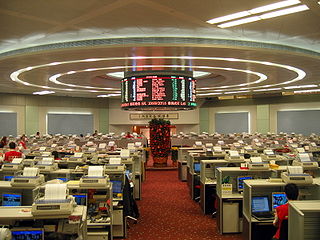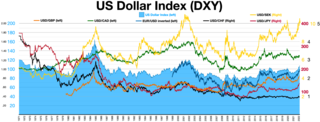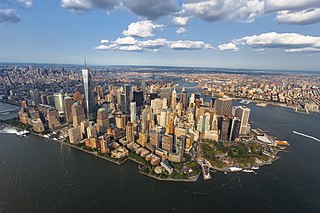
In trade, barter is a system of exchange in which participants in a transaction directly exchange goods or services for other goods or services without using a medium of exchange, such as money. Economists usually distinguish barter from gift economies in many ways; barter, for example, features immediate reciprocal exchange, not one delayed in time. Barter usually takes place on a bilateral basis, but may be multilateral. In most developed countries, barter usually exists parallel to monetary systems only to a very limited extent. Market actors use barter as a replacement for money as the method of exchange in times of monetary crisis, such as when currency becomes unstable or simply unavailable for conducting commerce.

A commodity market is a market that trades in the primary economic sector rather than manufactured products. The primary sector includes agricultural products, energy products, and metals. Soft commodities may be perishable and harvested, while hard commodities are usually mined, such as gold and oil. Futures contracts are the oldest way of investing in commodities. Commodity markets can include physical trading and derivatives trading using spot prices, forwards, futures, and options on futures. Farmers have used a simple form of derivative trading in the commodities market for centuries for price risk management.

The London Stock Exchange (LSE) is a stock exchange based in London, England. As of July 2024, the total market value of all companies trading on the LSE stood at $3.42 trillion. Its current premises are situated in Paternoster Square close to St Paul's Cathedral. Since 2007, it has been part of the London Stock Exchange Group. Despite a post-Brexit exodus of stock listings from the London Stock Exchange, the LSE was the most valued stock exchange in Europe as of 2023. According to the 2020 Office for National Statistics report, approximately 12% of UK-resident individuals reported having investments in stocks and shares. According to a 2020 Financial Conduct Authority report, approximately 15% of British adults reported having investments in stocks and shares.
A futures exchange or futures market is a central financial exchange where people can trade standardized futures contracts defined by the exchange. Futures contracts are derivatives contracts to buy or sell specific quantities of a commodity or financial instrument at a specified price with delivery set at a specified time in the future. Futures exchanges provide physical or electronic trading venues, details of standardized contracts, market and price data, clearing houses, exchange self-regulations, margin mechanisms, settlement procedures, delivery times, delivery procedures and other services to foster trading in futures contracts. Futures exchanges can be integrated under the same brand name or organization with other types of exchanges, such as stock markets, options markets, and bond markets. Futures exchanges can be organized as non-profit member-owned organizations or as for-profit organizations. Non-profit, member-owned futures exchanges benefit their members, who earn commissions and revenue acting as brokers or market makers; they are privately owned. For-profit futures exchanges earn most of their revenue from trading and clearing fees, and are often public corporations.

The Stock Exchange of Hong Kong is a stock exchange based in Hong Kong. It is one of the largest stock exchanges in Asia and the 9th largest globally by market capitalization as of August 2024. The exchange plays a crucial role in connecting international investors with mainland Chinese companies, serving as a major platform for capital raising. Unlike mainland Chinese exchanges, it operates under Hong Kong’s distinct regulatory framework, which allows greater access to foreign investors.

The foreign exchange market is a global decentralized or over-the-counter (OTC) market for the trading of currencies. This market determines foreign exchange rates for every currency. It includes all aspects of buying, selling and exchanging currencies at current or determined prices. In terms of trading volume, it is by far the largest market in the world, followed by the credit market.

The Shanghai Stock Exchange is a stock exchange based in the city of Shanghai, China. It is one of the three stock exchanges operating independently in mainland China, the others being the Beijing Stock Exchange and the Shenzhen Stock Exchange. The Shanghai Stock Exchange is the world's third largest stock market by market capitalization exceeding $6 trillion in July 2024. It is also Asia's biggest stock exchange. Unlike the Hong Kong Stock Exchange, the Shanghai Stock Exchange is still not entirely open to foreign investors and often affected by the decisions of the central government, due to capital account controls exercised by the Chinese mainland authorities.

The Tehran Stock Exchange (TSE) is Iran's largest stock exchange, which first opened in 1967. The TSE is based in Tehran. As of October 2024, 663 companies with a combined market capitalization of US$ 94 billion were listed on TSE. TSE, which is a founding member of the Federation of Euro-Asian Stock Exchanges, has been one of the world's best performing stock exchanges in the years 2002 through 2013. TSE is an emerging or "frontier" market.
The Dalian Commodity Exchange (DCE) is a Chinese futures exchange based in Dalian, Liaoning province, China. It is a non-profit, self-regulating and membership legal entity under the China Securities Regulatory Commission (CSRC), established on February 28, 1993.

A financial centre or financial hub is a location with a significant concentration of participants in banking asset management, insurance, and financial markets, with venues and supporting services for these activities to take place. Participants can include financial intermediaries, institutional investors, and issuers. Trading activity can take place on venues such as exchanges and involve clearing houses, although many transactions take place over-the-counter (OTC), directly between participants. Financial centres usually host companies that offer a wide range of financial services, for example relating to mergers and acquisitions, public offerings, or corporate actions; or which participate in other areas of finance, such as private equity, hedge funds, and reinsurance. Ancillary financial services include rating agencies, as well as provision of related professional services, particularly legal advice and accounting services.

The economy of London is dominated by service industries, particularly financial services and associated professional services, which have strong links with the economy in other parts of the United Kingdom (UK) and internationally. In addition to being the capital city of the United Kingdom, London is one of the world's leading financial centres for international business and commerce and is one of the "command centres" for the global economy.

The London Bullion Market Association, established in 1987, is the international trade association representing the global Over The Counter (OTC) bullion market, and defines itself as "the global authority on precious metals". It has a membership of approximately 150 firms globally, including traders, refiners, producers, miners, fabricators, as well as those providing storage and secure carrier services.
LCH is a financial market infrastructure company headquartered in London that provides clearing services to major international exchanges and to a range of OTC markets. The LCH Group includes two main entities: LCH Limited based in London and LCH SA based in Paris.

Greece is a maritime nation by tradition, as shipping is arguably the oldest form of occupation of the Greeks and has been a key element of Greek economic activity since ancient times. Today, shipping is the country's most important industry worth $21.9 billion in 2018. If related businesses are added, the figure jumps to $23.7 billion, employs about 392,000 people, and shipping receipts are about 1/3 of the nation's trade deficit. In 2018, the Greek Merchant Navy controlled the world's largest merchant fleet, in terms of tonnage, with a total DWT of 834,649,089 tons and a fleet of 5,626 Greek-owned vessels, according to Lloyd's List. Greece is also ranked in the top for all kinds of ships, including first for tankers and bulk carriers.
Minor metals is a widely used term in the metal industry that generally refers to metals which are a by-product of smelting a base metal. Minor metals do not have a real exchange, and are not traded on the London Metal Exchange (LME).
The London bullion market is a wholesale over-the-counter market for the trading of gold, silver, platinum and palladium. Trading is conducted amongst members of the London Bullion Market Association (LBMA), tightly overseen by the Bank of England. Most of the members are major international banks or bullion dealers and refiners.

Alpari is a multinational foreign exchange, precious metals and CFD broker with headquarters in several countries. The company is licensed to trade in Saint Vincent and the Grenadines.

The Moscow Exchange is the largest exchange in Russia, operating trading markets in equities, bonds, derivatives, the foreign exchange market, money markets, and precious metals. The Moscow Exchange also operates Russia's central securities depository, the National Settlement Depository (NSD), and the country's largest clearing service provider, the National Clearing Centre. The exchange was formed in 2011 in a merger of the Moscow Interbank Currency Exchange and the Russian Trading System.
David Munro Anderson is a Scottish businessman with a distinguished career in the City of London. He was closely involved in the development of the futures contract trading industry in London. Anderson was chairman of the formation committee for the International Petroleum Exchange, joint chairman of the formation committee for the Baltic International Freight Futures Exchange and former vice-chairman of the London Commodity Exchange. As a director of the Securities and Investments Board (SIB) he played a key role in implementing the Financial Services Act 1986 in the United Kingdom.
The London Platinum and Palladium Market (LPPM) is an over-the-counter trading centre for platinum and palladium and a commodity trading association. London has always been a centre for the research in and development of most of the platinum group metals. Trade was established in the early 20th century, typically by existing dealers of gold and silver. The LPPM has been involved in fixing the world market prices of platinum and palladium since 1989.












